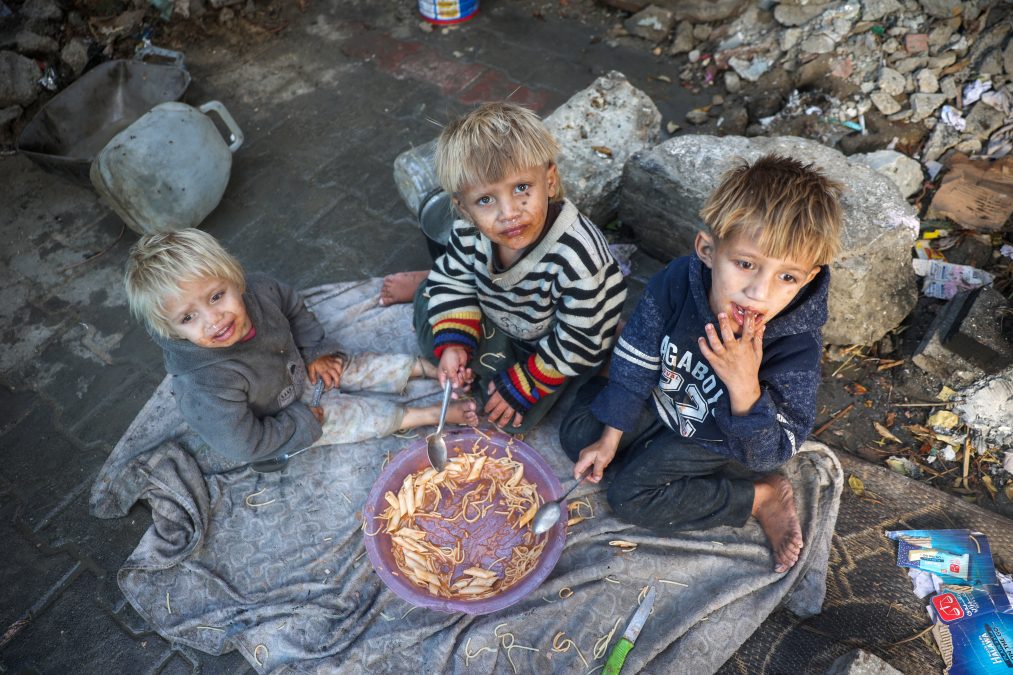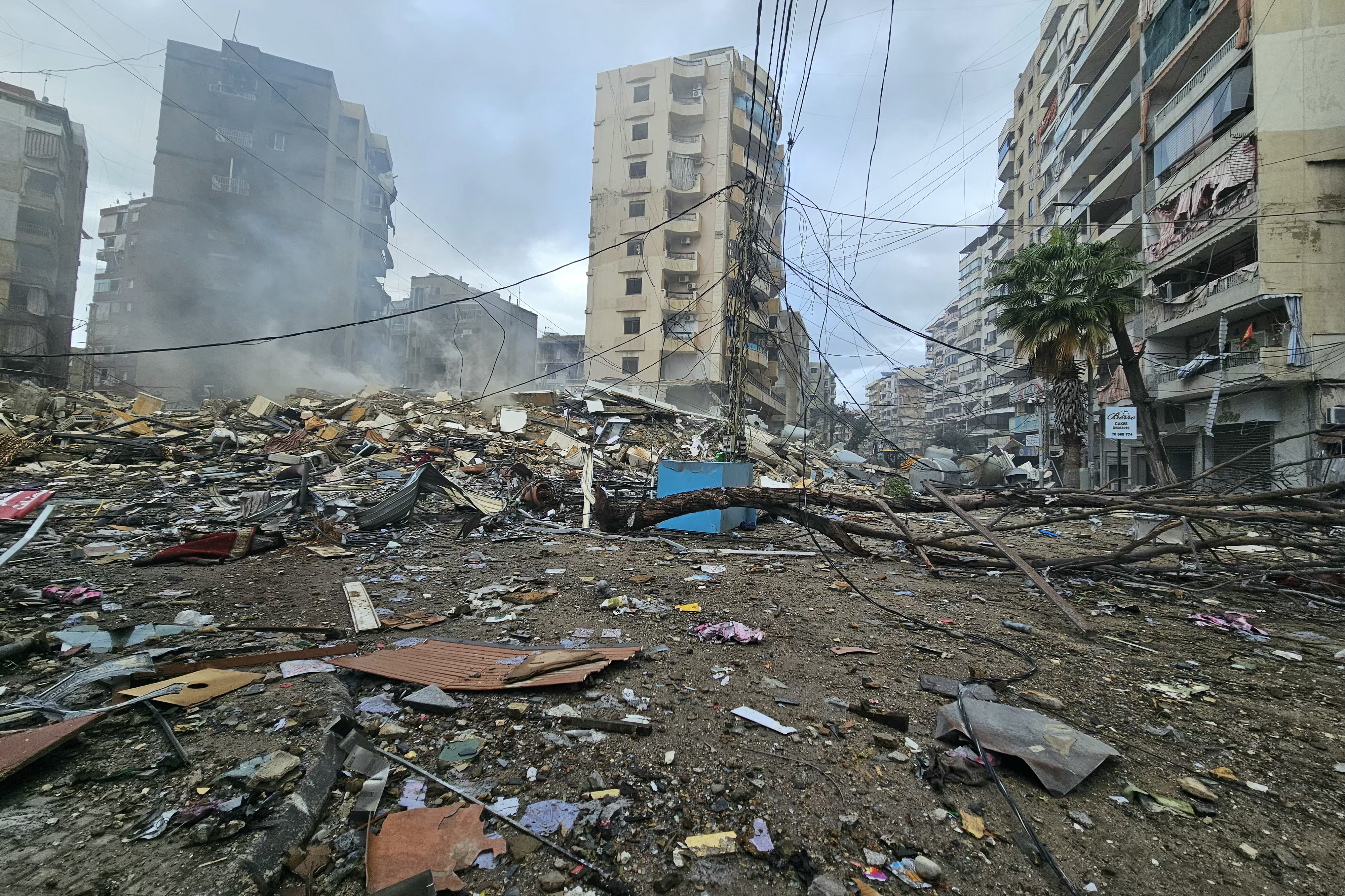Beirut — Top EU diplomat Josep Borrell called for an immediate ceasefire in the Israel-Hezbollah war while on a visit to Lebanon on Sunday, as the militant group claimed a wave of cross-border attacks.
Lebanon’s health ministry said on Sunday that the Israeli strike on central Beirut’s working-class Basta district a day earlier killed at least 29 people, updating an earlier toll.
“The Israeli enemy strike on Basta al-Fawqa in Beirut killed, in an updated but still not final toll, 29 people and wounded 67 others,” the ministry said in a statement. “Rubble is still being removed” from the strike site, it added.
Earlier this week, US special envoy Amos Hochstein said in Lebanon that a truce deal was “within our grasp”, and then headed to Israel for talks with officials there.
War between Israel and Hezbollah escalated in late September, nearly a year after the Iran-backed group began launching strikes in solidarity with its Palestinian ally Hamas following its October 7 attack.
The conflict has killed at least 3,670 people in Lebanon since October 2023, according to the health ministry, most of them since September.
In the Lebanese capital, Borrell held talks with parliament speaker Nabih Berri, who has led mediation efforts on behalf of ally Hezbollah.
“We see only one possible way ahead: an immediate ceasefire and the full implementation of United Nations Security Council Resolution 1701,” Borrell said after his meeting with Berri.
Under Resolution 1701, which ended the last Hezbollah-Israel war of 2006, only Lebanese troops and UN peacekeepers should be allowed to maintain a presence in the south, where Hezbollah holds sway.
It also called for Israel to withdraw troops from Lebanon.
“Back in September I came and was still hoping we could prevent a full-fledged war of Israel attacking Lebanon. Two months later Lebanon is on the brink of collapse,” Borrell said.
He said the European Union was ready to provide 200 million euros ($208 million) to help bolster the Lebanese armed forces.
On Sunday, the army said an Israeli strike on a military post killed one soldier and wounded 18 others.
Also on Sunday, Hezbollah said it launched attacks using missiles and drones directed at a naval base in southern Israel and a “military target” in Tel Aviv.
It said it had “launched, for the first time, an aerial attack using a swarm of strike drones on the Ashdod naval base”.
The group also claimed to have carried out an operation against a “military target” in Tel Aviv using “a barrage of advanced missiles and a swarm of strike drones”.
The Israeli military said air raid sirens were activated in several areas of central and northern Israel, adding that it had intercepted projectiles fired from Lebanon.
Israel’s emergency medical service Magen David Adom said it had provided treatment to two people including a 70-year-old woman who was mildly injured.
On Saturday, Lebanon said Israeli strikes around the country killed more than 55 people, many of them in central Beirut.
One strike on the working-class Basta neighborhood of Beirut killed at least 20 people and wounded 66 others, Lebanon’s health ministry said.
“We saw two dead people on the ground… The children started crying and their mother cried even more,” said Samir, 60, who lives in a building facing the one destroyed.
In a phone call with Israeli Defense Minister Israel Katz on Saturday, Washington’s Defense Secretary Lloyd Austin “reiterated US commitment to a diplomatic resolution” in the Lebanon war, a Pentagon spokesperson said.
A spokesman for Katz said he commended US efforts towards de-escalation in Lebanon, but said Israel would “continue to act decisively in response to Hezbollah’s attacks on civilian populations in Israel”.
On the Gaza front, Hamas’s armed wing said Saturday that an Israeli hostage, captured during the group’s October 7 attack which triggered the war, had been killed.
Israel’s military said it could neither “confirm nor refute” the claim.
Israeli protesters held another of their regular Saturday rallies in Tel Aviv to demand their government reach a deal to free remaining hostages.
On Sunday, Gaza’s civil defense agency said a drone strike had seriously injured a hospital chief in an attack on the healthcare facility, while Israeli raids killed 11 people across the Palestinian territory.
Hossam Abu Safiya heads the Kamal Adwan hospital, one of just two partly operating facilities in northern Gaza, as the territory is in the grip of a dire humanitarian crisis.

Hamas’s October 7 attack on Israel that triggered the Gaza war resulted in the deaths of 1,206 people, mostly civilians, according to an AFP tally of Israeli official figures.
Israel’s retaliatory campaign in Gaza has killed at least 44,211 people, most of them civilians, according to the data, which the United Nations considers reliable.
Criticism of Israel has mounted over its conduct of the war, and this week the International Criminal Court issued arrest warrants for Prime Minister Benjamin Netanyahu and his former defense minister Yoav Gallant.
It has also issued a warrant for Hamas military chief Mohammed Deif, though it is unclear whether he is still alive.
In Gaza, hospital staff have reported several strikes on the facility, while the World Health Organization chief said he was “deeply concerned about the safety and well-being of 80 patients, including eight in the intensive care unit” at Kamal Adwan hospital.
Hospitals in the Gaza Strip have been hit multiple times since the outbreak of war between Israel and Hamas.
Gaza’s civil defense agency on Sunday morning also said 11 people, “including children”, have been killed after two Israeli air strikes on Al-Bureij and Al-Maghazi refugee camps in central Gaza and artillery fire in Beit Lahia.
Witnesses also described artillery fire in Al-Mawasi in southern Gaza.
“I am afraid,” said 30-year-old Rania Abu Jazar, after she was forced to leave her makeshift shelter, a tent, in the early hours of the morning after intense fire.
“My children are hungry and my (one-year-old) daughter Amal’s milk is in the tent. I do not know what to do. If we return, they might shell us again, the tanks are blind and they do not care about killing children and women,” she added.
Later on Sunday, Lebanese state media reported two Israeli strikes on Beirut’s southern suburbs, about an hour after the Israeli military posted evacuation calls online for parts of the Hezbollah bastion.
“Israeli warplanes launched two violent strikes on Beirut’s southern suburbs in the Kafaat area,” the official National News Agency said.
The southern Beirut area has been repeatedly struck since September 23 when Israel intensified its air campaign also targeting Hezbollah bastions in Lebanon’s east and south. It later sent in ground troops to southern Lebanon.
AFPTV footage showed grey smoke billowing over south Beirut.
The raids “caused massive destruction over a large geographical area” of the Kafaat district, NNA said.
Earlier Sunday, Israeli military spokesman Avichay Adraee warned on social media platform X that the military would strike “Hezbollah facilities and interests” in the Hadath and Burj al-Barajneh districts, also sharing maps of the areas to be evacuated.
AVOID THE FULL-FLEDGED WAR WITH SYRIA
The UN special envoy for Syria said on Sunday that it was “extremely critical” to end the fighting in Lebanon and Gaza to avoid the country being pulled into a regional war.
“We need now to make sure that we have immediately a ceasefire in Gaza, that we have a ceasefire in Lebanon, and that we avoid Syria being dragged even further into the conflict,” said Geir Pedersen ahead of a meeting with the Syrian foreign minister in Damascus.
“We agree that it is extremely critical that we de-escalate so that Syria is not further dragged into this,” he said.
Since Syria’s civil war erupted in 2011, Israel has carried out hundreds of strikes in the country, mainly targeting the army and Iran-backed groups.
The Israeli military has intensified its strikes on targets in Syria since its conflict with Iran-backed Hezbollah in neighboring Lebanon escalated into full-scale war in late September after almost a year of cross-border hostilities.
The Syrian Observatory for Human Rights war monitor said Israeli strikes on the city of Palmyra earlier in the week killed 105 people, the vast majority of them were alleged to be pro-Iran fighters, in the deadliest such attack on Tehran-backed groups to date.
Israel rarely comments on individual strikes in Syria but has repeatedly said it will not allow Iran to expand its presence in the country, while it continues to strike Arab countries with free will.








